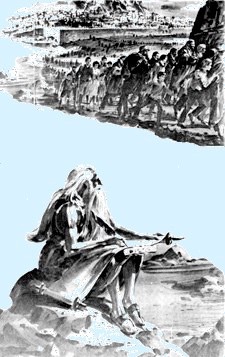Study to shew thyself approved unto God, a workman that needeth not to be ashamed, rightly dividing the word of truth. 2 Tim. 2:15

King James AV1611
The Book of Zechariah
Zechariah was taught by Dr. James Modlish
"GOD REMEMBERS"
Lesson One
(Chapter 1:1-6)
Introduction:
The city of Jerusalem is much in the news these days, and many are asking, "Will it be attacked again?" The answers to these, and many more questions are found in the Book of Zechariah. The city of Jerusalem is mentioned 39 times in this book. In (1:12-17). God makes it clear that He is in control of the destiny of the city: "I will have mercy...I am jealous for Jerusalem...My house shall be built...The Lord shall yet comfort Zion and shall yet choose Jerusalem"!
HISTORICAL SETTING
When Zechariah began his ministry of encouragement and hope to the returned remnant, sixteen years had already elapsed since Cyrus had issued his decree in 536 B.C. (Ezra 1:1-4) and some 50,000 exiles had returned to Jerusalem from Babylon. With high hopes they planned to resettle in the land and rebuild the temple. By the second month of the following year (535 B.C.) they had laid the foundation of the structure (Ezra 3:11-13); but due to opposition from the Samaritans (Ezra 4:5). spiritual declension, and other causes, the work fell into abeyance for almost fourteen years while the people gave themselves to building their own homes and other selfish pursuits.
When Darius succeeded to the Persian throne, the prophets, Haggai and Zechariah, fearing that the decrees of former kings were void, began an arduous campaign under divine direction to resume the building of the temple. Inquiring and questioning of this by Persian officials led to referral of the matter to Babylon.
The original decree of Cyrus being brought to light, permission was confirmed by the Persian government and the project went forward until its completion four years later in the sixth year of Cyrus (Ezra 5:1-6,18).
THE WRITER
Zechariah was the son of Berechiah, the grandson of Iddo (1:1,7). The name Iddo is mentioned among the priests who returned from Babylon under Zerubbabel in 535 B.C. (Neh. 12:4; Ezra 5:1; 6:14). Zechariah was therefore a priest as well as a prophet. Presumably he was a very young man (cf. 2:4 [2:8]), while his contemporary Haggai was a very old man when Zechariah began his prophetic ministry, since Haggai apparently saw the first temple standing (Haggai 2:3).
Zechariah therefore means "Jehovah remembers". His father's name (Berechiah) means "Jehovah blesses", and his grandfather's name means "His time." Put them together and you have "Jehovah remembers to bless in His time."
THEMES OF ZECHARIAH
A. Christ is the main character of the book. In fact Christ is mentioned more in Zechariah than any other Old Testament book.
Important Messianic predictions of Zechariah include Jehovah's Servant, the Branch (3:8); the Man the Branch (6:12); King-Priest (6:13); the True Shepherd, Christ (11:4-11; 13:7) versus the False Shepherd, Anti-christ (11:15-17); Betrayal of the Good Shepherd (11:12,13); His Crucifixion (12:10); his Sufferings (13:7); His Second Advent in Glory (14:4).
B. Jerusalem - This book ranks next to Daniel as an Old Testament unveiling of God's plans for the Jews. The city of Jerusalem is mentioned 39 times in Zechariah. In Zechariah (1:14-17) you have the key verses of the book: God is jealous for Jerusalem; He will punish the heathen for what they did to His city; and He will one day restore the city in glory and peace. The fact that God has chosen Jerusalem in His grace is often mentioned in this book (1:17; 2:12; 3:2). He will have mercy on the city (1:12) and will one day dwell in the city (8:3,8).
C. Comfort - The book was written to be a comfort to Israel (1:13,17). Comfort comes through mystery i.e. (1:8, 18; 2:1-3; 4:1; 5:1,6). God comforts them through the promise of restoration (8:8; 10:9).
ZECHARIAH'S FIRST SERMON
I. CALL TO REPENTANCE (Zech. 1:1-3)
Zechariah preached what had been preached many times before. If man expects God to be responsive to his needs, it is essential for man to turn from sin (Isaiah 55:6,7; Jer. 3:12,13; Joel 2:12-13; Amos 5:4,6; Hos. 7:10; Mal. 3:7).
II. WARNING FROM HISTORY (Zech. 1:4-6)
Four times in the course of his introductory sermon Zechariah uses the expression "your fathers" (vss. 2,4,5,6). Their example of disobedience and apostasy is employed as a severe warning. DO NOT BE LIKE YOUR FATHERS! People look with pride, if possible, to their ancestors and frequently try to follow their example. But this is prohibited by Zechariah. the reason is plain. their fathers were not only neglectful but inattentive to the Word of the Lord which was preached by the former prophets.
-Page Navigation-
Lessons: 1 | 2 | 3 | 4 | 5 | 6 | 7 | 8 | 9 | 10 | 11 | 12 | 13 | 14 | 15 | 16 | 17 | 18 | 19 | 20

